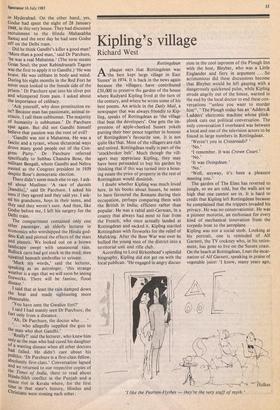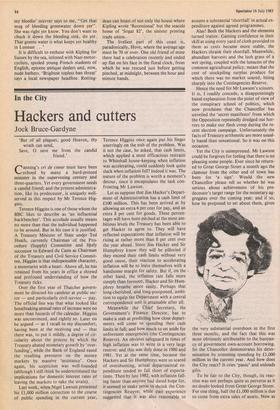Kipling's village
Richard West
Rottingdean plaque says that Rottingdean was 'the best kept large village in East Sussex' in 1974. It is back in the news again because the villagers have contributed 00,000 to preserve the garden of the house where Rudyard Kipling lived at the turn of the century, and where he wrote some of his best poems. An article in the Daily Mail, a newspaper that was always friendly to Kip- ling, speaks of Rottingdean as 'the village that beat the developers'. One gets the im- pression of apple-cheeked Sussex yokels putting their beer pence together in honour of Rottingdean's favourite son. It is not quite likelhat. Most of the villagers are rich and retired. Rottingdean really is part of the 'stockbroker belt'. Much though the vill- agers may appreciate Kipling, they may have been persuaded to buy his garden by thinking that if this was turned into a hous- ing estate the price of property in the rest of Rottingdean would diminish.
I doubt whether Kipling was much loved here. In his books about Sussex, he seems to have favoured the Romans during their occupation, perhaps comparing them with the British in India; efficient rather than popular. He was a rabid anti-German, in a county that always had most to fear from the French, who once actually landed at Rottingdean and sacked it. Kipling startled Rottingdean with fireworks for the relief of Mafeking. After the Boer War was over he bullied the young men of the district into a territorial unit and rifle club.
According to Lord Birkenhead's splendid biography, Kipling did not get on with the local publican. 'He engaged in angry discus-
sion in the cool taproom of the Plough Inn with the host, Bleyber, who was a Little Englander and fiery in argument ... So acrimonious did these discussions become that Bleyber would be left gasping with a dangerously quickened pulse, while Kipling strode angrily out of the house, warned in the end by the local doctor to end these con- versations "unless you want to murder him". 'The Plough today has an 'Adders & Ladders' electronic machine whose plink- plonk cuts out political conversation. The only conversation I overheard was between a local and one of the television actors to be found in large numbers in Rottingdean.
'Weren't you in Crossroads? '
'No.'
'I remember. It was Crown Court.' 'No.'
'It was Ovingdean.'
'No.'
'Well, anyway, it's been a pleasure meeting you.'
The garden of The Elms has reverted to jungle, so we are told, but the walls are so high that one cannot see in. It is hard to credit that Kipling left Rottingdean because he complained that the trippers invaded his privacy. He was no conservationist. He was a pioneer motorist, an enthusiast for every kind of mechanical innovation from the torpedo boat to the aeroplane.
Kipling was not a social snob. Looking at his portrait, one is reminded of Alf Garnett, the TV cockney who, in his retire- ment, has gone to live on the Sussex coast. On the beach at Rottingdean, I met the incar- nation of Alf Garnett, speaking in praise of vegetable juice: 'I know, many years ago, 'I like the Pearson-Flythes — they're the very stuff Of myth.' my bleedin' muvver says to me, "Get that mug of bleeding greenwater down yer". She was right yer know. You don't want to chuck it down the bleeding sink, do yer. That greens water is what keeps yer healthy in Lunnun It is difficult to enthuse with Kipling for Sussex by the sea, infested with Nazi motor- cyclists, spoiled young French students of English, epicene antique dealers and, now, nude bathers. 'Brighton topless ban threat' says a local newspaper headline. Rotting- dean can boast of not only the house where Kipling wrote 'Recessional' but the seaside home of `Sogat 82', the sinister printing trade union.
The liveliest part of this coast is, paradoxically, Hove, where the average age must be 70 or over. One old friend of mine there had a celebration recently and ended up flat on his face in the floral clock, from which he was rescued just before getting pinched, at midnight, between the hour and minute hands.







































 Previous page
Previous page